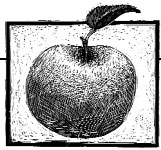Bench to Bedside
Drug therapy and diet
By Lionel D. Lewis, M.B., B.Ch., M.D. (email)
Physicians and pharmacists often warn patients not to drink alcohol while taking tranquilizers or sedatives or to combine certain medications. For instance, some overthe- counter cold remedies should not be taken with monoamine oxidase inhibitors, drugs used to treat depression. But only recently has the medical community become aware that ordinary foods may wreak havoc with medications, too. More than a decade ago, it was discovered, quite by accident, that grapefruit juice could increase the potency of blood pressure medications.

|
|
As far as we know, no other fruits—such as apples, oranges,
or cranberries—have the same effect that grapefruit does. |
Discovery: In 1989, researchers at the University of Western Ontario were investigating how ethanol (alcohol) affects the pharmacodynamics of an antihypertensive drug, felodipine. Ten patients with mild hypertension participated in a placebo-controlled crossover study, receiving either a dose of oral felodipine plus ethanol or a dose of oral felodipine plus a placebo; the following week, they were switched to the alternate therapy. Either grapefruit juice or orange juice was used to mask the taste of the pure ethanol.
The researchers found, unexpectedly, that the blood concentrations of felodipine in patients who took the drug plus ethanol with grapefruit juice were much higher than in those who took it with orange juice. Somehow, the grapefruit juice made felodipine more potent. While it's true that ethanol alone can enhance the vasodilating and blood-pressure-lowering effects of felodipine, the grapefruit juice seemed to further enhance the effects—but only when the felodipine was taken orally. When felodipine was given intravenously, drinking grapefruit juice had no effect.
Then, in 1992, researchers at the University of Michigan Medical Center discovered how grapefruit juice increased the absorption of felodipine in the small intestine. They found that grapefruit juice was reducing the production of one of the most prolific drug-metabolizing enzymes in the body—CYP3A4. When there's less enzyme to break down a drug, more of it gets absorbed into the bloodstream.
Interactions: In the late 1990s, researchers began to discover that grapefruit juice altered the effectiveness of other drugs, too. Ingesting as little as 200 to 250 ml (about a cup) of grapefruit juice—or just two grapefruit segments—before taking certain oral medications could increase the systemic blood concentrations of those drugs from 30% to 900%. So far, the medications known to interact with grapefruit juice include immunosuppressant drugs (such as cyclosporine); calcium channel blockers (felodipine, amlodipine, verapamil, nifedipine, nisoldipine), which are used to treat blood pressure or angina; many sedatives and anxiolytics (midazolam, triazolam, alprazolam); certain hormones (estrogens and corticosteroids); antihistamines (astemizole and terfenadine, the latter now unavailable in the United States); certain antiseizure drugs (carbamazepine); many of the statin drugs (atorvastatin, simvastatin, lovastatin), which are used to lower blood lipids; and certain drugs used to treat AIDS (the protease inhibitors ritonavir, saquinivir, and indinavir). Other drugs are continually being added to this list.
As far as we know, no other fruits—such as apples, oranges, or cranberries (or their juices)— have the same effect that grapefruit does. The grapefruit effect is probably due to certain of its chemical components—6',7'-dihydroxybergamottin (a furanocoumarin) and/or naringin or naringenin (both flavonoids)—which are thought to inhibit the CYP3A4 enzyme in the small intestine.
We know we must make physicians and patients aware of how grapefruit juice can affect many oral medications, but efforts to bring the issue to public attention have had varied success around the world. Australia seems to be at the forefront: pharmacists there are required by law to attach labels to containers of cyclosporine, felodipine, midazolam, nifedipine, nisoldipine, quinidine, terazosin, terfenadine, and triazolam stating: "Avoid eating grapefruit and drinking grapefruit juice while being treated with this medication." But other known grapefruit-drug interactions that could cause considerable morbidity have not been so overtly flagged. And in the U.S., the warnings that appear in even the most recent edition (2000) of the Physicians' Desk Reference are not comprehensive, although this may reflect the time lag endemic to the dissemination of scientifically correct information. The U.S. Food and Drug Administration is still in the process of developing regulatory guidelines. At DHMC, however, grapefruit juice is no longer offered to inpatients as a dietary choice.
Modulation: Every day, we are learning more about how other foods and dietary supplements interact with therapeutic drugs. It was only recently discovered that St. John's Wort (an herbal product that supposedly improves mood and decreases anxiety) reduces the blood concentrations of drugs such as cyclosporine and indinavir. Scientists suspect that this herbal remedy may increase the amount of CYP3A4 made by cells in the gastrointestinal tract, possibly by modulating a promoter element in the DNA that codes for the enzyme.
By continuing to unravel the mysteries of medication-food interactions, as well as of medication-medication interactions, we hope to see improvements in patient care in years to come. Maybe, one day, we'll have figured out how we can deliberately use grapefruit juice or its key components to decrease the dosage and increase the effectiveness of certain medications—and cut costs, too!
Lewis is an associate professor of medicine and of pharmacology and toxicology at Dartmouth Medical School and vice chair of the American Board of Clinical Pharmacology.
Back to Fall 2000 Dartmouth Medicine
